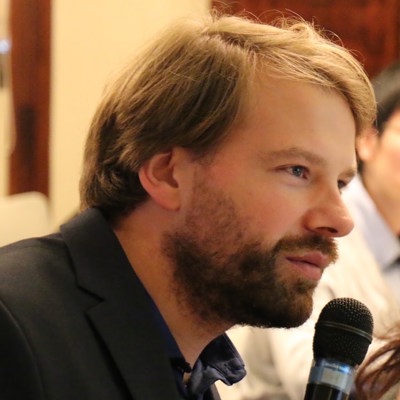15. May 2025, 10:30 – 10:55 Uhr
KI und Autonomie in der Hochschullehre - Update 2025
Die Nutzung von KI-Technologien an den Hochschulen kann die Autonomie der Lernenden, Lehrenden und der Hochschulen als Institutionen beeinflussen — positiv wie negativ. Seit wir diese These auf dem U:FF 2024 formuliert haben, hat sich die Lage rasch weiterentwickelt. Wir stellen den aktuellen Stand der Entwicklung vor – mithilfe der Ergebnisse aus einem dreitätigen Expert*innen-Workshop am Zentrum für Interdisziplinäre Forschung in Bielefeld. Wir untersuchen, wie KI tatsächlich eingesetzt wird, welche Auswirkungen das auf die Autonomie hat, wie genau Autonomie in diesem Kontext zu verstehen ist und welche Regeln wir uns geben sollten, um Autonomie zu stärken.
Literatur: - Bahr, Amrei, & Mayer, Maximilian (2024). Auswege aus der digitalen Unmündigkeit. Frankfurter Allgemeine Zeitung, 15.01.2024.https://www.faz.net/aktuell/karriere-hochschule/hoersaal/ki-modelle-an-hochschulen-ausgang-aus-der-digitalen-unmuendigkeit-19434782.html - Dempere, Juan, Modugu, Kennedy, Hesham, Allam, & Ramasamy, Lakshmana (2023). The impact of ChatGPT on higher education. Frontiers of Education, 8. https://doi.org/10.3389/feduc.2023.1206936 - Fernández, Antonio, Gómez, Beatriz, Binjaku, Kleona, Meçe, Elinda Kajo (2023): Digital transformation initiatives in higher education institutions: A multivocal literature review. Education and Information Technologies 28 (10), 12351-12382. - Floridi, Luciano (2020). The fight for digital sovereignty: What it is, and why it matters, especially for the EU. Philosophy & technology, 33, 369-378. https://doi.org/10.1007/s13347-020-00423-6 - Holmes, Wayne, Stracke, Christian M., Chounta, Irene-Angelica …. Wasson, Barbara (2024). Artificial Intelligence and Education: Ethical questions and guidelines for their relations based on human rights, democracy and the rule of law. In D. Burgos (Ed.), Radical Solutions for Artificial Intelligence and Digital Transformation in Education. Lecture Notes in Educational Technology. Springer. - Kasneci, Enkelejda, Sessler, Kathrin, Küchenmann, Stefan, …, & Kasneci, Gjergji (2023). ChatGPT for good? On opportunities and challenges of large language models for education. Learning and Individual Differences, 103, 102274.https://doi.org/10.1016/j.lindif.2023.102274 - Komljenovic, Janja 2021. The rise of education rentiers: digital platforms, digital data and rents. Learning, Media and Technology 46(3), 320-332. - Messeri, Lisa & Crockett, M.J. (2024). Artificial intelligence and illusions of understanding in scientific research. Nature, 627, 49-58. https://doi.org/10.1038/s41586-024-07146-0 - Paaßen, Benjamin (2024). Warum Hochschulen jetzt eigene Sprachmodelle hosten sollten. Wiarda-Blog, 26.01.2024.https://www.jmwiarda.de/2024/01/26/warum-hochschulen-jetzt-selbst-sprachmodelle-hosten-sollten/ - Pohle, Julia, & Thiel, Thorsten (2020). Digital sovereignty. Internet Policy Review, 9(4). https://doi.org/10.14763/2020.4.1532 - Ramiel, Hemy & Fisher, Eran (2023). The epistemic machinery of educational platforms. Learning, Media and Technology, 1-16. https://doi.org/10.1080/17439884.2023.2243812 - Perrotta, Carlo & Pangrazio, Luci (2023). The critical study of digital platforms and infrastructures: Current issues and new agendas for education technology research. Education Policy Analysis Archives 31. - Rafner, Janet, Dellermann, Dominik, Hjorth, Arthur, Veraszto, Dora, Kampf, Constance, MacKay, Wendy, & Sherson, Jacob (2022). Deskilling, upskilling, and reskilling: a case for hybrid intelligence. Morals & Machines, 1(2), 24-39. https://doi.org/10.5771/2747-5174-2021-2-24
Speaker:innen
 Benjamin Paassen
Benjamin Paassen
Netzwerk KI und digitale Autonomie in Wissenschaft und Bildung Amrei Bahr
Amrei Bahr
Juniorprofessorin für Philosophie der Technik und Information, Uni Stuttgart Maximilian Mayer
Maximilian Mayer
Jun.-Prof. Dr. Maximilian Mayer, Universität Bonn
Track
AI & Technology
Raum
Digital 11
Sprache
DE
Format
Input


